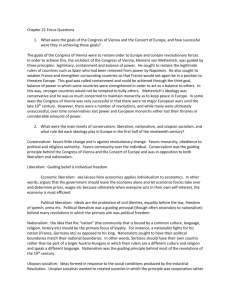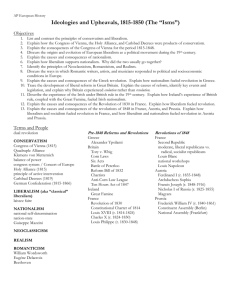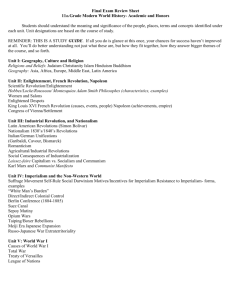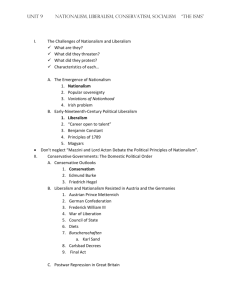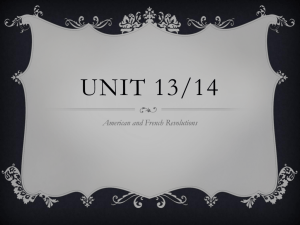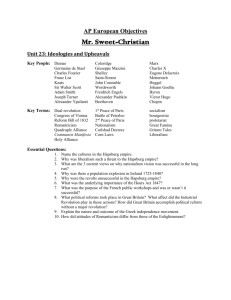Revolutions of the 1820s to 1830 - Mr. Morris's AP European History
advertisement
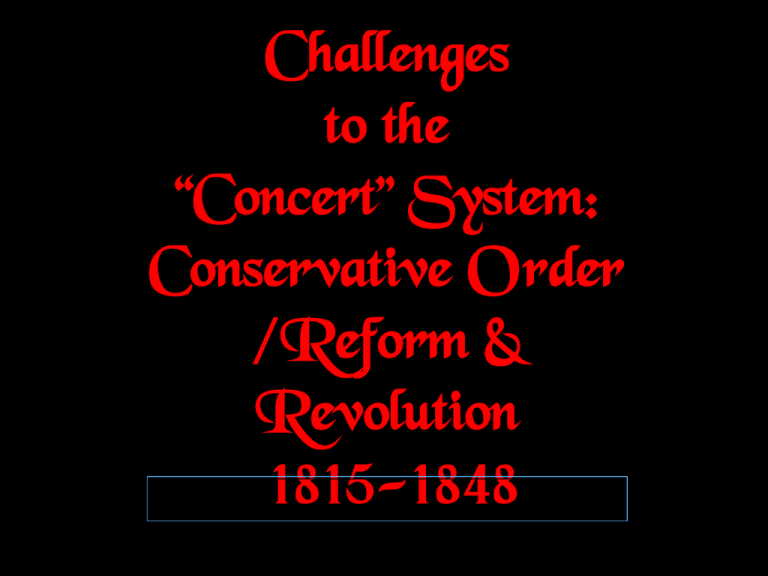
Challenges to the “Concert” System: Conservative Order /Reform & Revolution 1815-1848 The Conservative Order & the Economic Advance Objective: Students are to analyze the prevailing political and economic philosophies that propelled the historical events of the first half of the 19th century. 1. Analyze the political and economic theories prevalent in conservatism, liberalism, radicalism (socialism/communism). 2. Analyze the social effects among the nobility, bourgeoisie, proletariat and the peasantry. 3. Analyze the goals of the “Concert of Europe” and how liberalism and nationalism challenged these goals. 4. Analyze the how romanticism fueled nationalism. 5. Compare and contrast the American Revolution with the Revolutions in Latin America. 6. Analyze how reforms, revolts and revolutions in Europe challenged the conservative order. 7. Analyze the emergence of new social classes and how this new working class became politically active. 8. Analyze the family structures among the working class and women. 9. Compare and contrast the philosophies of classical economics with early forms of socialism. 10. Analyze the causes of the Revolutions of 1848. Led to Challenges to the Conservative Order Nationalism & Liberalism The Conservative Order & the Economic Advance Was challenged by Industrial Society Was challenged by Pol/Econ Philosophies & Revolutions Philosophies -Nationalism -Classical Economics -Threatened to breakup -Adam Smith -Population/Migration empires (Aus,Rus,Ottoman) -Laissez-faire -Improvements in transp -Threatened to unify others -Thomas Malthus -Railways,steamships,canals (Germany, Italy) -Population theory -New Labor Force -Liberalism -David Ricardo -Working Class -Elected parliaments -Iron Law of Wages -Wage labor -Free trade -Early Socialism -chartism -Laissez-faire -Utopian Socialism -Family Structures - Conservativism -St. -Role of Women -Austria- Metternich Simon/Owen/Fourier -Child labor- Factory Act 1833 suppress lib & nat -Anarchism -Prison Reform -German States- Carlsbad -Blanqui -Police Force (bobbies) Decrees -Proudhon -Penal Colonies (Aus/NZ) -Russia- Decembrists -Marxism -Auburn & Philadelphia System -Britain- Peterloo/Six Acts -Communist -France- The Charter/July Manifesto/Kapital Revolution -Revolutions of 1848 - Spanish Revolution (1820) -Liberals & Nationalists -Concert of Europe rise up against European -Latin American Revolutions conservative order Geography Europe 1815 Following the Napoleonic Napoleonic Wars, nationalism threatened to Fin breakup the empires of Austria Austria, Russia, Ottoman Empire Empire. Russia and the Ottoman Nor Scot However, nationalism was also Est Confederation stirring in the Italian and ENGLAND William and Mary replace James II of the Rhine German states that could Lat London (German States) Great Glorious unify Revolution in 1688. Denmark Amsterdam in the potentially these peoples Ire Lith nation-states NETHERLANDS into nation-states. Nether They make the English Bill of Britain lands Liberalism also threatened to in 1689. Russia toppleRights existing regimes regimes or force Paris Prussia EUROPE Ukr representative governments with Pol FRANCE autocratic constitutions upon the autocratic Bel Revolution monarchies of Europe. Czech Pol ends Slov The Revolutions of 1830 and France monarchy. 1848 will dramatically illustrate Ger Austria that point. French Swiss go Kingdom of Sweden . It from Rep of Venice Portugal monarchy to Basque Italian democracy States Spain to monarchy. Papal SardiniaStates PiedmontSea Mediterranean Spanish Naples AFRICA Hun Serb/ Croat Rom Serb Bul Mace Ottoman Alb Greek Empire The Conservative Order and the Challenges of Reform - The Congress of Vienna Congress of Vienna -met in 1814 and 1815 to redraw the map of Europe after the Napoleonic era -attempted to provide some way of preserving the future peace of Europe. -Europe was spared a general war throughout the remainder of the 19th century -Failure of statesmen who shaped the future of Europe in 18141815 *Didn’t recognize the factors unleashed by the French Revolution: -Nationalism and liberalism Attempted to maintain the status quo The “Big Four” The Vienna Settlement •was the work of the representatives of the four nations that had done the most to defeat Napoleon. Prince Klemens Von Metternich (Austria) •Epitomized conservative reactionism. Lord Castlereagh (England) •balance of power on the continent and surround France with larger stronger states. Karl Von Hardenberg Karl Von Hardenberg (Prussia) Goal was to recover Prussian territory lost to Napoleon & gain additional territory in northern Germany (Saxony). Czar Alexander I (Russia) – Advocated an independent Poland under Russian control Talleyrand Periogord TalleyrandFrench Foreign Minister – not initially included in the early deliberations – Mediator where the interests of Prussia and Russia clashed with those of England and Austria. Talleyrand brought France into the ranks of the principal powers. “The Dancing Congress” • European gathering was held amid much pageantry. –Parties, balls, and banquets reminded the delegates what life had been like before 1789. –Intended to generate favorable “public opinion” and occupy the delegates since they had little to do of any serious nature. Principles of Settlement The three main principles discussed at the Congress of Vienna were: Legitimacy Returning to power the ruling families deposed Dynasties restored in Holland, Sardinia, Tuscany and Modena Compensation Territorially rewarding those states which had made considerable sacrifices to defeat Napoleon. Balance of Power Meant arranging the map of Europe so that never again could one state upset the international order and cause a general war. Various adjustments were made in the countries of Europe in order to surround France. Enforcement of the Status Quo Arrangements to guarantee the enforcement of the status quo as defined by the Vienna settlement now included tow provisions: The “Holy Alliance” An unpractical attempt to unify Europe, only taken seriously by Alexander I of Russia. The “Quadruple Alliance” Russia, Prussia, England and Austria provided for concerted action to arrest any threat to the peace or balance of power. England and Austria differed on their definition of concerted action. The Congress System From 1815 to 1822, European international relations were controlled by the series of meetings held by the Great Powers to monitor and defined the status quo: The Congress (1816) The Congress The Congress The Congress of Aix-la-Chapelle of Troppau (1820) of Laibach (1821) of Verona (1822) –The principle of collective security required unanimity among members of the Quadruple Alliance. -Failure occurred because of the conflicting interests of the Great Powers Evaluation • The Congress of Vienna has been criticized for ignoring the liberal and nationalist aspirations of so many peoples. -Hindsight suggests the statesmen at Vienna may have been more successful in stabilizing the international system than we have been able to do in the 20th century. –Not until the unification of Germany in 1870-71, was the balance of power upset. –Not until World War I in 1914, did Europe have another general war. -Hindsight tells us however that the leading statesmen at Vienna underestimated the new nationalism and liberalism generated by the French Revolution. Conservatism, Nationalism, & Liberalism Conservatism • Conservatism Reaction to liberalism –became a popular alternative for those frightened by the violence of the French Revolution. Early Conservatism allied to the restored monarchial governments of Austria, Russia, France, and England. Support for conservatism: –came from the traditional ruling classes. –Also supported by the peasants -A majority of the population Supported by Romantic writers –conservatives believed in order, society and the state, Edmund Burke- Father of Conservative Thought Characteristics of Conservatism Conservatives viewed history as a continuum (Traditions) Conservative Beliefs: –The basis of society is organic, not contractual –Stability and longevity, not progress and change, mark a good society. –The only legitimate sources of political authority were God and history. •Rejected the “social contract” theory •Conservatives believed selfinterests do not lead to social harmony, but to social conflict. Denounced individualism and natural rights. To conservatives, society was hierarchical. Liberalism Liberalism -first major theory in the to teach that the individual is a selfsufficient being, whose freedom is the sole reasons for the existence of society. -Come from the middle classes and favored increased liberty for their class and indirectly, for the masses of people, as long as the latter did not in their turn ask for too much freedom • Liberalism was reformist and political not revolutionary in nature. -Come from the middle classes and favored increased liberty for their class and indirectly, for the masses of people, as long as the latter did not in their turn ask for too much freedom Characteristics of Liberalism •Individuals are entitled to seek their freedom in the face of arbitrary or tyrannical restrictions imposed upon them. •Utilitarianism –Founded by Jeremy Bentham –Supported the concept of natural rights. •Best guaranteed by written constitutions. •theory held the pleasurepain principle as its key idea. equated pleasure with good and pain with evil. –Supported the concept of “the greatest happiness for the greatest number.” • Liberals also advocated the “Balance of Power” theory and free trade. Economic Liberalism •Liberals advocated economic individualism. •Economic liberalism –All Supported laissez faire economics •“Wealth of Nations” by Adam Smith 1776 –Free Trade –Laissez-faire •Thomas Malthus •Essay on the Principle of Population •population theory (Dismal Theory) –Ricardo’s Principles of Political Economy –“Iron Law of Wages” –Based on the realities of a new industrial era. Adam Smith- The Wealth of Nations Thomas Malthus- “Dismal Theory” •The Industrial Revolution is beginning to take place throughout Europe. David Ricardo- “The Iron Law of Wages” Early 19th Century Liberals •England: –Thomas Robington Macaulay & John Stuart Mill •France: –Benjamin Constant, Victor cousin, Jean Baptiste Say and Alexis de Tocqueville •Germany: – Wilhelm von Humboldt, Friedrich List, Karl von Rotteck and Karl Theodor Welcker The Impact of Liberalism •Liberalism –involved in the various revolutionary movements of the early 19th century. •Over ten constitutions secured between 1815 and 1848 in states of the German Confederation. •Reform measures in Britain -governments adopted liberal reforms after 1832 and ruled for decades –be born with the emergence of new voters -It affected German student organizations (Burschenchaften) and permeated Prussian life. Alexis de Tocqueville •Tocqueville –Liberal who warned against the “tyranny of the majority –Govt take away freedom to create equality (economic) •These fears were not without foundation. In the 20th century, the masses have sometimes shown themselves willing to trade freedom for authority, order, economic security, and national power. • Nazi Germany, Fascist Italy, Communist Russia Nationalism •Liberal thought in early 19th century Europe was dramatically revealed through an explosive force called nationalism. –Liberal ideas raised the nationalistic consciousness of people •a common language, soil, traditions, history, culture and shared human experiences. – –These ideas were needed to promote political unity –these were also the ideas that fostered the identity nationhood or nation-state was aroused and made militant during the turbulent French Revolutionary era. Characteristics of Nationalism •Early nationalist sentiment was romantic, exuberant and cosmopolitan in nature. •The breakdown of society’s traditional loyalties to church, dynastic state and region began during the course of the 18th century. –Popular Sovereignty •Impelled by the French Revolution, new loyalties were fashioned. • The concept of a nation of people being united by a common language, culture, and history and governed for the good of the whole. Impact of Nationalism •Nationalistic thinkers and writers examined the language, literature, and folkways of their people, thereby stimulating nationalist feelings. •Emphasized the history and culture of various European people –tended to reinforce and glorify national sentiment. •Early 19th century nationalist leaders adopted the ideas of the German philosopher-historian Johann Gottfried Herder (1744-1803) –regarded as the “Father of modern nationalism.” –Taught that every people is unique and possesses a distinct national character, or Volksgeist., which as evolved over several centuries. • • No one culture or people is superior to any other. All national groups are parts of that great whole Revolutionary Movements in the Early 19c •The Conservative Order •Spanish Revolution of 1820 (Ferdinand VII of Spain Dissolves Cortes) -Promised Constitution but revoked promise -Latin American colonies & military rebels against Ferdinand -Congress of Troppau Metternich at the Congress of Laibach got permission to invade Naples after Revolution broke out -Greek Revolution in 1821 “The Eastern Question” What to do about the “sickman of Europe.” -Decembrist Revolt (1825) Military officers attempt to takeover new Czar and get a constitution 19c Latin American Independence Movements Wallachia & Moldavia Independence Movements in the Balkans Greek Revolution - 1821 Greek Independence 4 The “Eastern Question” 4 Hetairia Philike a secret society that inspired an uprising against the Turks in 1821. 4 Pan-Hellenism 4 1827 Battle of Navarino Br, Fr, Rus destroyed the Ottoman-Egyptian fleet. 4 1828 Rus declared war on the Otts. Greece on the Ruins of Missilonghi by Delacroix, 1827 4 1829 Treaty of Adrianople 4 1830 Greece declared an independent nation [Treaty of London]. Lord Byron – Martyr in Greece The Decembrist Uprising - 1825 The Decembrist Revolt, 1825 4 Russian upper class had come into contact with western liberal ideas during the Napoleonic Wars. 4 Late November, 1825 Czar Alexander I died suddenly. He had no direct heir dynastic crisis • • Constantine married a woman, not of royal blood. • Russian troops were to take an oath of allegiance to Nicholas, who was less popular than Constantine [Nicholas was seen as more reactionary]. Nicholas named by Alexander I as his heir before his death. December 26, 1825 a Moscow regiment marched into the Senate Square in St. Petersburg and refused to take the oath. The Decembrist Revolt, 1825 4 They wanted Constantine. 4 Nicholas ordered the cavalry and artillery to attack the insurgents. Over 60 were killed. 5 plotters were executed. Over 100 insurgents were exiled to Siberia. 4 Results: The first rebellion in modern Russian history where the rebels had specific political goals. In their martyrdom, the Decembrists came to symbolize the dreams/ideals of all Russian liberals. Nicholas was determined that his power would never again come into question he was terrified of change! The Decembrist Uprising - 1825 4Orthodoxy! 4Autocracy! 4Nationalism! Nicholas I The 1830 Revolutions France: The “Restoration” Era 4 France emerged from the chaos (1815-1830) of its revolutionary period as the most liberal large state in Europe. 4 Louis XVIII governed France as a Constitutional monarch. He agreed to observe the 1814 “Charter” or Constitution of the Restoration period. • • • • Limited royal power. Granted legislative power. Protected civil rights. Upheld the Napoleon Code. Louis XVIII (r. 1814-1824) Raft of the Medusa • • Painting was a social commentary on French state Becomes a metaphor for discontent among the masses – French frigate crashes in Mediterranean • Captain who crashed ship was a noble who received job based on birth rite rather than merit found incompetent • Starving people hanging onto a make-shift raft struggling to survive – “All of France is on that raft” – The incompetent Louis XVIII who received his job by birth not merit leads the country aimlessly The “Ultras” 4 France was divided by those who had accepted the ideals of the Fr. Revolution and those who didn’t. 4 The Count of Artois was the leader of the “Ultra-Royalists” 4 1815 “White Terror” Royalist mobs killed 1000s of former revolutionaries. 4 1816 elections The Count of Artois, the future King Charles X (r. 1824-1830) The Ultras were rejected in the Chamber of Deputies election in favor of a moderate royalist majority dependent on middle class support. France: Conservative Backlash 4 1820the Duke of Berri, son of Artois, was murdered. 4 Royalists blamed the left. 4 Louis XVIII moved the govt. more to the right Changes in electoral laws narrowed the eligible voters. Censorship was imposed. 4 Liberals were driven out of legal political life and into illegal activities. 4 1823 triumph of reactionary forces! Fr troops were authorized by the Concert of Europe to crush the Spanish Revolution and restore another Bourbon ruler, Ferdinand VII, to the throne there. King Charles X of France (r. 1824-1830) 4 His Goals: Lessen the influence of the middle class. Limit the right to vote. Put the clergy back in charge of education. Public money used to pay nobles for the loss of their lands during the Fr Revolution. 4 His Program: Attack the 1814 Charter. Control the press. Dismiss the Chamber of Deputies when it turned against him. Appointed an ultra-reactionary as his first minister. King Charles X of France (r. 1824-1830) 41830 Election brought in another liberal majority. 4July Ordinances He dissolved the entire parliament. Strict censorship imposed. Changed the voting laws so that the government in the future could be assured of a conservative victory. To the Barracades Revolution, Again!! Workers, students and some of the middle class call for a Republic! Louis Philippe The “Citizen King” 4 The Duke of Orleans. 4 Relative of the Bourbons, but had stayed clear of the Ultras. 4 Lead a thoroughly bourgeois life. 4 His Program: Property qualifications reduced enough to double eligible voters. Press censorship abolished. The King ruled by the will of the people, not by the will of God. The Fr Revolution’s tricolor replaced the Bourbon flag. 4 The government was now under the control of the wealthy middle class. (r. 1830-1848) Louis Philippe The “Citizen King” 4 His government ignored the needs and demands of the workers in the cities. They were seen as another nuisance and source of possible disorder. 4 July, 1832 an uprising in Paris was put down by force and 800 were killed or wounded. 4 1834 Silk workers strike in Lyon was crushed. Seething underclass. A caricature of Louis Philippe Was seen as a violation of the status quo set down at the Congress of Vienna. Belgian Independence, 1830 4 The first to follow the lead of France. 4 Its union with Holland after the Congress of Vienna had not proved successful. 4 There had been very little popular agitation for Belgian nationalism before 1830 seldom had nationalism arisen so suddenly. 4 Wide cultural differences: North Dutch Protestant seafarers and traders. South French Catholic farmers and individual workers. Belgian Revolution - 1830 A Stirring of Polish Nationalism - 1830 A Stirring of Polish Nationalism - 1830 4 The bloodiest struggle of the 1830 revolutions. 4 The Poles in and around Warsaw gain a special status by the Congress of Vienna within the Russian Empire. Their own constitution. Local autonomy granted in 1818. 4 After Tsar Alexander I dies, the Poles became restless under the tyrannical rule of Tsar Nicholas I. 4 Polish intellectuals were deeply influenced by Romanticism. 4 Rumors reached Poland that Nicholas I was planning to use Polish troops to put down the revolutions in France and Belgium. 4 Several Polish secret societies rebelled. A Stirring of Polish Nationalism - 1830 4 Had the Poles been united, this revolt might have been successful. But, the revolutionaries were split into moderates and radicals. 4 The Poles had hoped that Fr & Eng would come to their aid, but they didn’t. 4 Even so, it took the Russian army a year to suppress this rebellion. 4 The irony by drawing the Russian army to Warsaw for almost a year, the Poles may well have kept Nicholas I from answering Holland’s call for help in suppressing the Belgian Revolt. Europe in 1830 The Results of the 1820s-1830 Revolutions? 1. The Concert of Europe provided for a recovery of Europe after the long years of Revolution and Napoleonic Wars. 2. The conservatives did NOT reverse ALL of the reforms put in place by the French Revolution. 3. Liberalism would challenge the conservative plan for European peace and law and order. 4. These revolutions were successful only in W. Europe: Their success was in their popular support. Middle class lead, aided by the urban lower classes. 5. The successful revolutions had benefited the middle class the workers, who had done so much of the rioting and fighting, were left with empty hands! 6. Therefore, these revolutions left much unfinished & a seething, unsatisfied working class.
